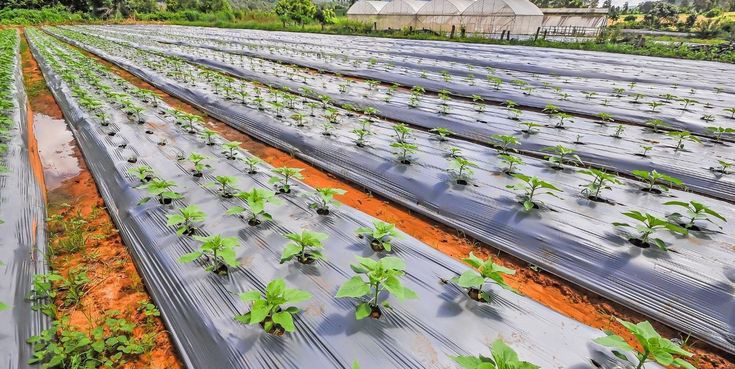The role of Mulching in Agriculture
MULCHING:
Mulching is a sustainable agricultural practice that involves covering the soil surface with a layer of organic or inorganic material to improve soil health, conserve moisture, and control weeds. This technique has been used for centuries by farmers around the world to enhance crop yields, reduce water usage, and improve soil fertility. In this blog, we will explore the role of mulching in agriculture and its benefits.
What is Mulching?
Mulching is the process of covering the soil surface with organic or inorganic materials. Organic mulches include grass clippings, leaves, straw, wood chips, and compost. Inorganic mulches include black plastic, landscape fabric, and stones. Mulching helps to retain moisture in the soil, suppress weeds, regulate soil temperature, and improve soil fertility.
Role of Mulching in Agriculture:
Mulching has several benefits in agriculture. Let's explore some of the most important ones:
1. Improves Soil Health
Mulching helps to improve soil health by adding organic matter to the soil. Organic matter provides nutrients to the soil, improves soil structure, and enhances soil fertility. As the mulch breaks down, it releases nutrients such as nitrogen, phosphorus, and potassium into the soil, which are essential for plant growth.
2. Conserves Moisture
Mulching helps to conserve moisture in the soil by reducing evaporation. Mulch acts as a barrier between the soil surface and the atmosphere, reducing water loss through evaporation. This is particularly important in areas with low rainfall or where water is scarce.
3. Controls Weeds
Mulching helps to control weeds by suppressing their growth. Mulch prevents sunlight from reaching the soil surface, which inhibits weed seed germination and growth. This reduces the need for herbicides and manual weeding, which can save time and money.
4. Regulates Soil Temperature
Mulching helps to regulate soil temperature by insulating the soil from temperature fluctuations. This is particularly important in areas with extreme temperatures, where plants may be stressed by heat or cold. Mulch helps to maintain a consistent soil temperature, which can improve plant growth and yield.
5. Reduces Erosion
Mulching helps to reduce soil erosion by protecting the soil surface from wind and water erosion. Mulch acts as a barrier that prevents soil particles from being carried away by wind or water. This is particularly important in areas with sloping terrain or where heavy rainfall is common.
Benefits of Mulching
Mulching has several benefits for farmers, including:
1. Improved crop yield:
Mulching helps to improve crop yield by improving soil health and fertility. The nutrients released by the mulch into the soil help to nourish the plants, which can lead to increased yield.
2. Reduced water usage:
Mulching helps to conserve moisture in the soil, reducing the need for irrigation. This can save water and reduce water usage, particularly in areas with low rainfall.
3. Reduced weed control costs:
Mulching helps to control weeds, reducing the need for herbicides and manual weeding. This can save farmers time and money.
4. Reduced erosion:
Mulching helps to reduce soil erosion, which can protect the soil and prevent nutrient loss. This can improve soil health and fertility, leading to improved crop yield.
Conclusion:
Mulching is a sustainable agricultural practice that has several benefits for farmers, including improved crop yield, reduced water usage, reduced weed control costs, and reduced erosion. By covering the soil surface with organic or inorganic material, farmers can improve soil health, conserve moisture, control weeds, regulate soil temperature, and reduce erosion. Mulching is a simple and effective technique that can help farmers to improve their yields, conserve resources, and protect the environment.
To order Mulching equipment




.jpeg)
Comments
Post a Comment